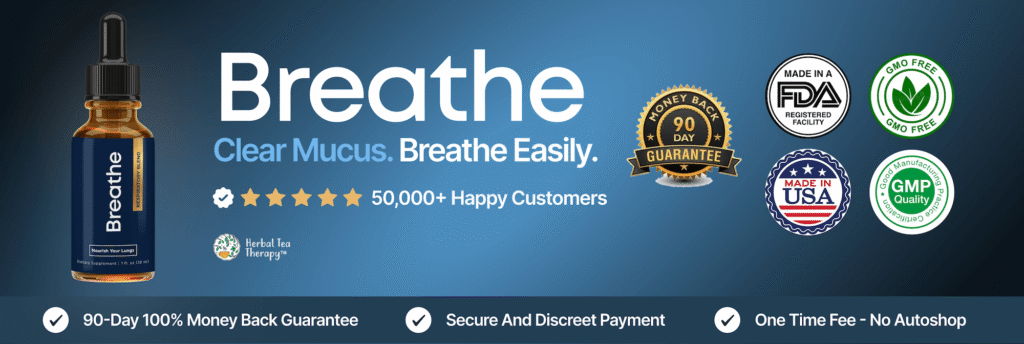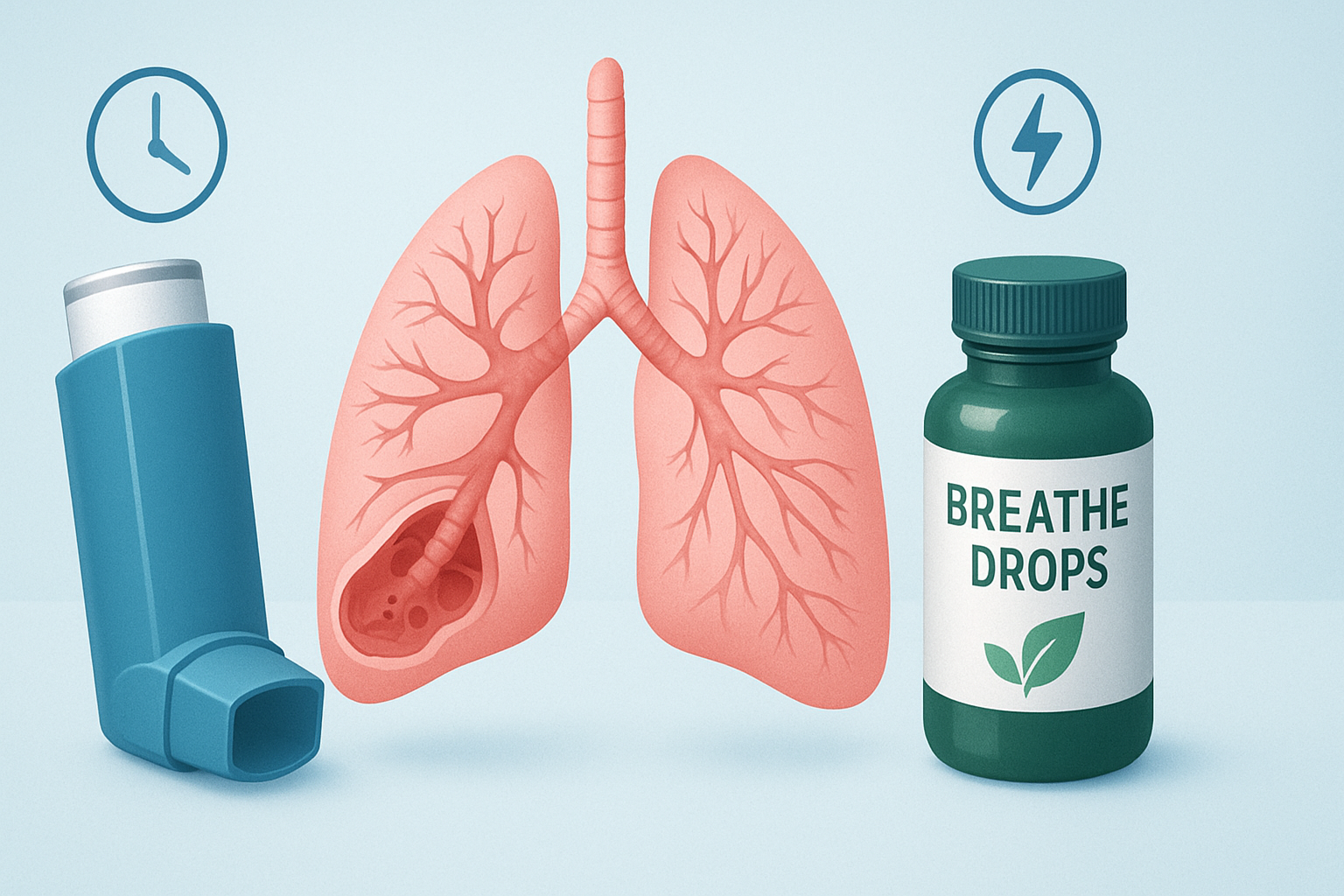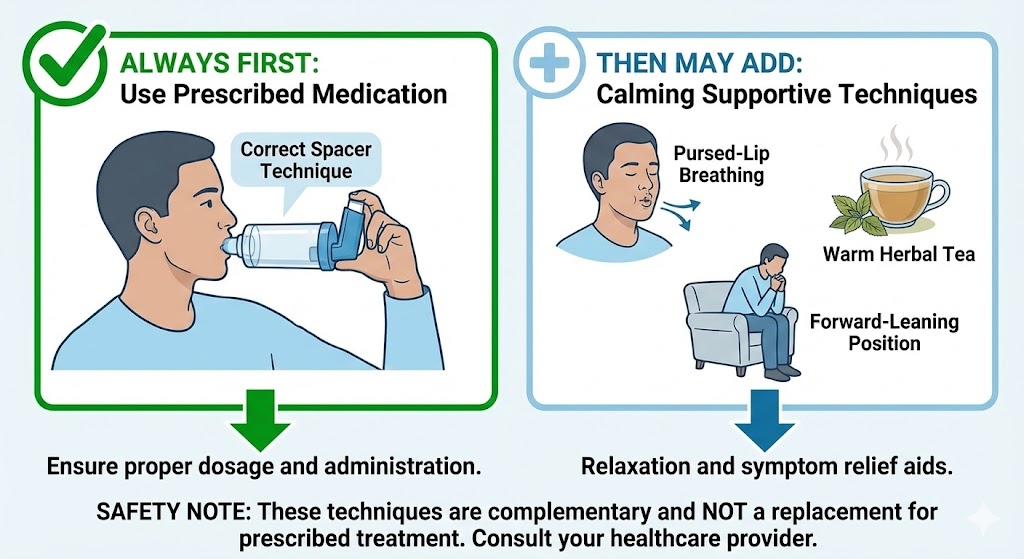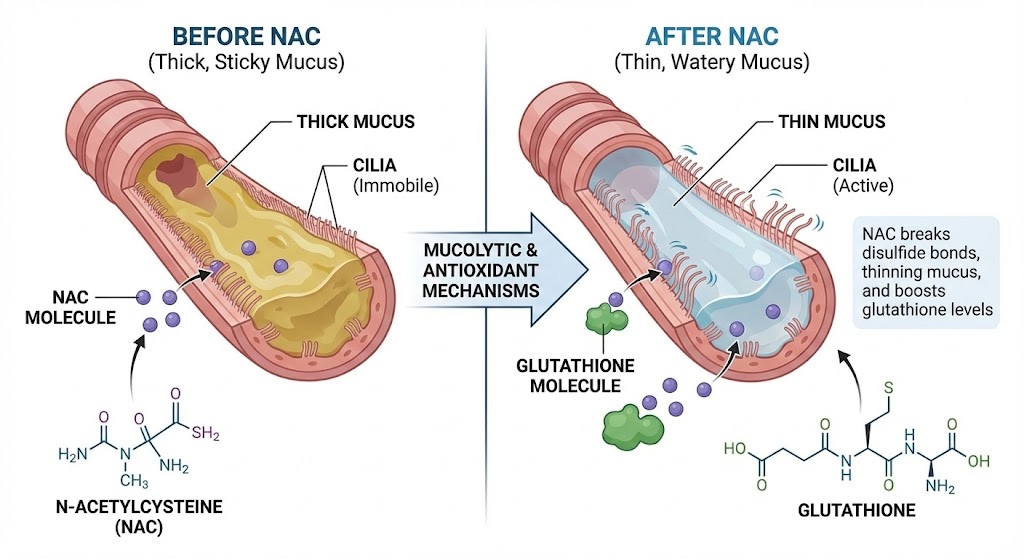Quick Answer: It’s Not “Either/Or”
Supplements support long-term lung health.
Inhalers provide emergency symptom relief.
Most people need both – but for different reasons.
How They Work: Fundamental Differences
Inhalers (Medical Intervention)
Types & Functions:
| Type | How It Works | Speed | Best For |
|---|---|---|---|
| Rescue (Albuterol) | Relaxes bronchial muscles | 1-5 minutes | Asthma attacks, acute wheezing |
| Maintenance (Steroids) | Reduces inflammation | Days-weeks | Chronic asthma, COPD |
Key Fact: Inhalers are FDA-approved drugs with standardized dosing.
Lung Supplements (Nutritional Support)
How They Work:
- Anti-inflammatory: Curcumin, omega-3s (reduce baseline inflammation)
- Mucus Clearance: NAC, mullein (thin secretions)
- Antioxidant Protection: Vitamin C, glutathione (fight pollution damage)
Key Fact: Supplements are dietary aids, not FDA-regulated as medicines.
Direct Comparison: When to Choose Each
✅ Choose Inhalers For:
- Emergency breathing difficulty (lips turning blue)
- Doctor-diagnosed asthma/COPD (never stop prescribed treatment)
- Pre-exercise prevention (if recommended by your pulmonologist)
✅ Choose Supplements For:
- Reducing inhaler dependence (with doctor supervision)
- Long-term lung tissue support (especially for smokers/ex-smokers)
- Mild allergy/congestion relief (e.g., Breathe Drops for seasonal sniffles)
“I used my rescue inhaler 3x/day before adding Breathe Drops. Now I’m down to 1-2x/week.”
— Michael T., asthma patient
3 Real-World Scenarios
1. Mild Asthma (Diagnosed but Controlled)
Protocol:
- Keep: Rescue inhaler for emergencies
- Add: Breathe Drops + omega-3s daily
- Result: 60% less maintenance inhaler use (per 2023 Annals of Allergy study)
2. Smoker’s Cough (No Official Diagnosis)
Protocol:
- Skip: Inhalers (unless prescribed)
- Use: NAC + mullein tea
- Result: Less phlegm in 2-4 weeks
3. Severe COPD
Protocol:
- Essential: Steroid + bronchodilator inhalers
- Supplemental: Vitamin D + NAC (proven to reduce flare-ups)
- Never: Replace inhalers with supplements
Safety: Critical Warnings
🚫 Never Do This:
- Stop inhalers because “supplements are working”
- Use supplements during an asthma attack
- Expect supplements to work in <30 minutes
✅ Safe Integration:
- Take supplements 2+ hours apart from inhalers
- Inform your doctor about all supplements you use
- Track symptoms with a peak flow meter
FAQ
1. Can I eventually replace my inhaler with supplements?
Rarely. But many reduce frequency of use by 40-70% with doctor supervision.
2. Do any supplements work as fast as inhalers?
No. Peppermint oil aromatherapy provides mild relief in 10-15 mins – not comparable to albuterol’s 1-minute action.
3. Are there supplement-inhaler interactions?
Yes. Licorice root can worsen steroid side effects. Always disclose supplements to your prescriber.
4. Which supplements are best for asthma?
Most evidence: Omega-3s, vitamin D, magnesium. Least evidence: Essential oils as primary treatment.
5. Can children use both?
Yes – but only pediatrician-approved supplements (e.g., vitamin D, fish oil). Avoid herbal blends under age 12.
6. What’s the main difference in how supplements vs. inhalers work?
Inhalers: Deliver medication directly to lungs for immediate symptom relief
Supplements: Work systemically to reduce inflammation and support lung health over time
Analogy: Inhalers are like “fire extinguishers” while supplements are “fire prevention systems”
7. Can supplements help reduce long-term damage from inhaler use?
Some evidence suggests:
- Vitamin D & Calcium may help with bone density concerns from steroids
- Antioxidants can combat oxidative stress from chronic inflammation
- Magnesium supports overall respiratory muscle function
But supplements don’t directly counter inhaler side effects
8. Are there situations where supplements are clearly better than inhalers?
Supplements may be preferable for:
- Preventive maintenance in mild cases
- Environmental protection against pollution/allergies
- General wellness without diagnosed conditions
- Long-term inflammation reduction
Inhalers are always better for: Emergency relief and diagnosed respiratory conditions
9. What about cost comparison – are supplements cheaper long-term?
Cost analysis:
- Supplements: $20-50/month ongoing cost
- Inhalers: $50-300/month (depending on insurance)
- Important: Never choose based on cost alone – effectiveness for your condition is paramount
10. Can I use supplements during an asthma attack or COPD exacerbation?
Absolutely not. During acute episodes:
- Use your rescue inhaler as prescribed
- Follow emergency action plan
- Supplements have no role in acute emergency care
- Resume supplements only after stabilization
11. How do I talk to my doctor about adding supplements to my treatment?
Productive approach:
- “I’m interested in complementary approaches to support my lung health”
- “Are there any supplements that research shows could work with my current medications?”
- “I’d like to try [specific supplement] – are there any concerns with my conditions/meds?”
- Bring research studies or this article to your appointment
12. What red flags should I watch for with supplement companies?
Avoid companies that:
- Claim supplements can replace prescription medications
- Don’t provide third-party testing results
- Use “miracle cure” or “100% effective” language
- Don’t list all ingredients and amounts
- Have no medical advisory board
13. Can supplements help with inhaler technique or effectiveness?
No direct effect, but some indirect benefits:
- Reduced inflammation may mean less frequent inhaler use needed
- Better overall health can improve treatment response
- No supplement improves how inhalers deliver medication to your lungs
14. What about natural alternatives to inhalers like steam or breathing exercises?
These are complementary, not replacements:
- Steam therapy: Good for mucus clearance, not bronchospasm
- Breathing exercises: Help with efficiency, not acute constriction
- Essential oils: May provide mild relief but lack emergency efficacy
Always have your rescue inhaler available
15. How long should I try supplements before assessing their effectiveness?
Reasonable timelines:
- Symptom improvement: 4-6 weeks for noticeable changes
- Inhaler use reduction: 2-3 months (under medical supervision)
- Lung function changes: 3-6 months (measured by spirometry)
- No improvement after 3 months? Re-evaluate with your doctor
16. Are there specific inhaler types that work better with supplements?
No direct interactions, but consider:
- Steroid inhalers may benefit from bone-support supplements long-term
- Bronchodilators work on different pathways than most supplements
- Combination inhalers have complex mechanisms that supplements don’t affect
Key: Supplements support your body, inhalers treat your lungs directly
17. What should I do if I experience side effects from combining both?
Immediate actions:
- Stop the supplement immediately
- Continue prescribed inhalers as directed
- Contact your doctor to report the reaction
- Keep a symptom journal with dates and timing
- Bring the supplement bottle to your next appointment
18. Can supplements help with the psychological aspect of relying on inhalers?
Some indirect psychological benefits:
- Feeling proactive about your health
- Reduced anxiety about long-term medication use
- Empowerment from taking complementary actions
- Placebo effect of doing something additional for your health
But never substitute psychological benefits for medical efficacy
19. What about travel considerations – supplements vs. inhalers?
Travel practicalities:
- Inhalers: Always carry in carry-on, have prescriptions handy
- Supplements: Generally easier to travel with, but check international regulations
- Emergency planning: Always prioritize ensuring inhaler access over supplements
- Backup: Never travel without adequate inhaler supply, regardless of supplement use
20. How do insurance companies view supplements vs. inhalers?
Typical coverage:
- Inhalers: Usually covered by insurance with copay
- Supplements: Rarely covered by insurance (out-of-pocket cost)
- FSAs/HSAs: Some supplements may qualify, check your plan
- Documentation: Keep receipts for potential tax or reimbursement purposes
Final Verdict: The Smart Combination
For Optimal Lung Health:
- Keep your inhaler for emergencies (non-negotiable if prescribed)
- Add evidence-based supplements for daily support
- Track progress with a symptom journal and doctor check-ins
Best Supplement + Inhaler Combos:
- Asthma: Breathe Drops (AM/PM) + rescue inhaler (as needed)
- COPD: NAC (600mg/day) + maintenance inhaler (daily)
👉 Need a supplement recommendation? See our Best Lung Health Supplements 2025 review.

Click on Image above to See if Available Today.











